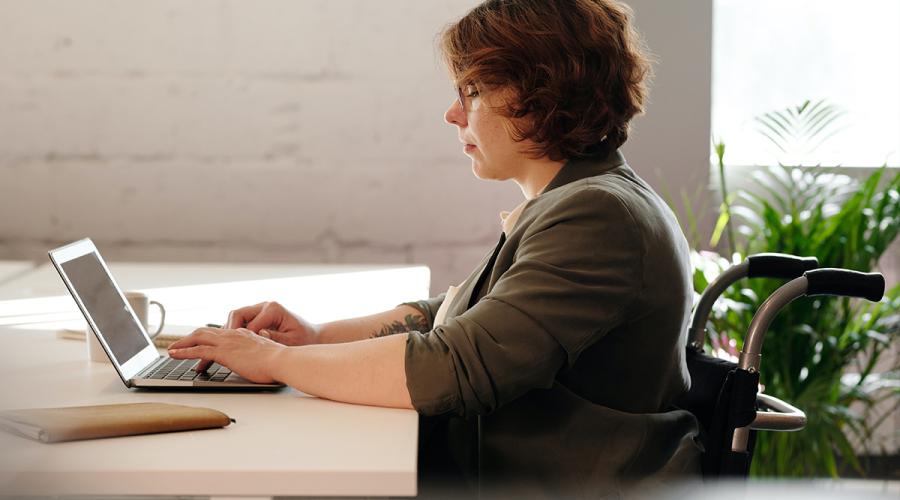
Wellness Considerations for Workers with Disabilities
COVID-19 has everyone working differently. Attempting to “flatten the curve,” many employers have coordinated work-from-home arrangements for their employees. Organizations are hosting virtual meetings and surveying employees to ensure that everyone feels connected and supported.
As a person with a disability, you may have concerns that your nondisabled colleagues do not. While in some respects, “you’ve got this” – after all, you are used to adapting – you may also be more vulnerable during the pandemic. Below are some tips and resources for maintaining your wellbeing.
Physical Wellness
Wash your hands often using soap and water for at least 20 seconds. If soap is not available or you are unable to get to or use a sink, hand sanitizer is a good alternative.
Don’t touch your face. If this is challenging, wear a mask or cloth over your mouth and nose throughout the day, taking off as needed for meals, etc. If wearing something on your face is not comfortable, consider how you might keep your hands busy (e.g., crafting, cooking, doing puzzles). These types of activities may also reduce anxiety.
Maximize the physical distance from and minimize your time with other people. If you must be in close proximity, such as when being assisted with eating, dressing, bathing, etc.
- Ask personal assistants (PAs) to honor the stay-at-home mandate.
- Ask them to report to work healthy, and to wear masks, gloves and other protective gear.
- If they provide assistance to someone else before coming to your home, ask that they change clothes before assisting you.
- Ask that they take their temperature daily. You might want them to take yours, too.
- Ask that they not bring others (e.g., kids who are now being homeschooled), into your home.
Cough and sneeze into your elbow. If this a challenge, wear a mask or cloth over your mouth and nose throughout the day. Keep tissues within reach. Keep a trashcan or sealable plastic bag nearby, and throw away tissues as soon as possible.
Avoid touching doorknobs, other items and surfaces. Try hitting the automatic door opener with your elbow; use gloves, a cloth or paper towel when touching door knobs. Remember to wash the clothes or gloves afterwards!
Clean items and surfaces you touch often, every day, including any mobility and communication aids and other equipment, as well as groceries, medications and other deliveries.
Maintaining a healthy diet, drinking water, exercising, minimizing stress, and getting sufficient rest are important for physical wellness, and may help you recover more quickly, if you contract the virus.
For assistance accessing healthcare, contact the National Disability COVID-19 Healthcare Support and Advocacy Hotline 1-800-626-4959.
Vocational and Financial Wellness
Many people are unemployed now. Finding employment after the pandemic may be even harder for people with disabilities. Strive to do your best; but realize that like everyone else, your best may be different in this “new normal”.
If you are an “essential employee” required to report to your worksite, know your rights. If you think your job can be performed from home, consider requesting a reasonable accommodation The U.S. Equal Employment Opportunity Commission and the Job Accommodation Network are both good resources. The EEOC states that your employer still has an obligation to continue accommodations you receive at work as you transition to telecommuting.
If working from home, be sure you have everything you need. If you rely on personal assistance, you may not have help during workday hours. With your employer, determine tasks that can be done when you are alone - you may require additional technology as an accommodation. Your organization’s HR unit or employee assistance program (EAP) may be able to help. Your local center for independent living is another good resource.
If you are out of work or are relying on meal delivery and other services now, finances may be a concern. See Resources for Financial Assistance During COVID-19.
Social and Emotional Wellness
The current situation reminds us that there is more to life than work. Take time to enjoy nature, connect or re-connect with family and friends, finish personal projects – do whatever brings you joy! Whatever your work situation, it’s important to take time to relax.
If your organization schedules times to socialize, join in! If not, initiate get-togethers via Zoom or other platforms. Get creative - host a Netflix watch party, attend worship services online, or plan a game night via www.Jackboxgames.com. If you are looking to meet more people with disabilities, attend virtual events hosted by organizations like The Mighty.
If you are experiencing increased stress or anxiety, ask your healthcare provider about tele-counseling and/or check out free mediation sites like https://www.headspace.com/ny.
Planning around COVID-19 has not fully included people with disabilities nor adequately addressed their needs. Disability activists are focusing efforts on home and community-based services that enable people to live and work outside of institutions; paid family and medical leave, access to medications and supplies, and equal access to proposed “Recovery Rebates.”
Let your state and federal lawmakers know how the pandemic is impacting you by posting on social media using #WeAreEssential. “People with underlying conditions” who are at increased risk for the virus include people with disabilities.